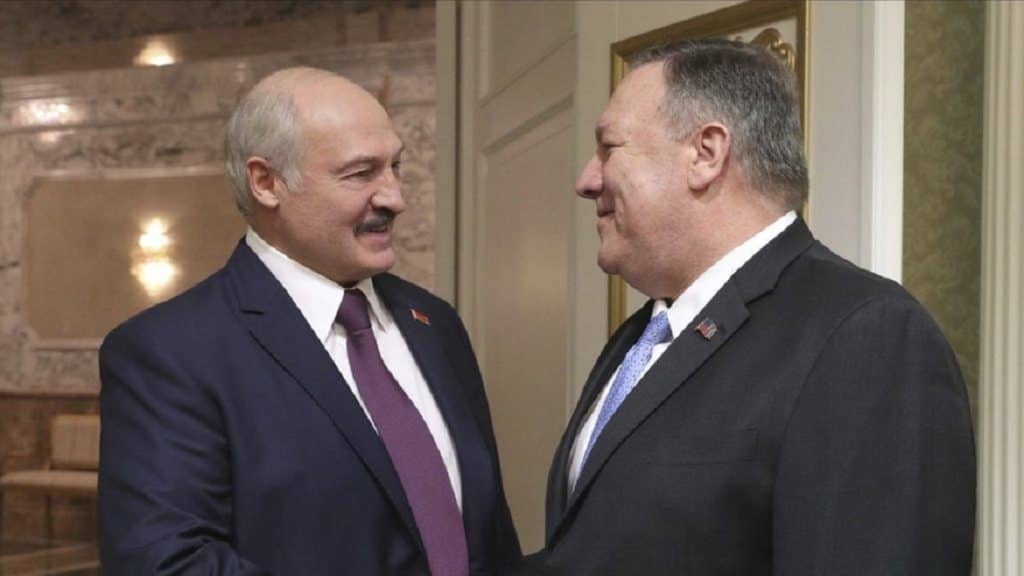By Denis Korkodinov
For the President of Belarus Alexander Lukashenko, the establishing friendly relations with the United States is a “moment of truth.” That is exactly what he officially stated, commenting on his decision to resume permanent contacts with the White House administration.
It is especially noteworthy that the Belarusian leader made this statement in anticipation of the meeting with the Russian delegation on February 7, 2020. Thus, Alexander Lukashenko emphasized that dialogue with Moscow is no longer a priority for Belarusian politics.
After the collapse of the USSR, Belarus demonstrated a stable relationship with Russia, on which it depended both economically and militarily. In addition, neglect by the United States, who consider Alexander Lukashenko to be the last “post-Soviet dictator” in Europe, brought the positions of Minsk and Moscow closer.
However, the situation changed dramatically when Washington imposed sanctions against the Belarusian regime, despite the fact that Russia was not determined to give Alexander Lukashenko the right to freely dictate his terms in relations with the Kremlin. This prompted the Belarusian leader to independently seek partners in the international arena that would break the existing dependence on Russian imports.
In this regard, the needs of Washington and Minsk coincided: the United States was determined to create a powerful outpost in the immediate vicinity of the state border of Russia, while Belarus was interested in becoming part of the “free market” under the protection of the countries of the North Atlantic Alliance.
It is worth noting that over the past 50 years, Minsk has been striving for a US alliance. However, if earlier the statement on pro-American sympathies was used by the Belarusian leader only to force the Soviet Union to increase the size of investments, now the request for an alliance with the White House administration has acquired, most likely, an irreversible character.
Russia, in turn, cannot oppose anything to Minsk, since the economic reforms announced by Vladimir Putin, aimed primarily at the active use of the National Wealth Fund, require a reduction in investment in the economies of post-Soviet countries. In this regard, the Union State between Russia and Belarus, on which the Kremlin had high hopes, is unlikely to ever be created in its final form, because Minsk, with a high degree of probability, was completely under the control of the United States.
Thus, the statement of Alexander Lukashenko about the “moment of truth” that defines his relationship with Washington is of particular importance. Thus, commenting on the expediency of the visit of US Secretary of State Mike Pompeo to Minsk, Alexander Lukashenko noted that he has long been working with him on the same team, ever since Mike Pompeo headed the CIA.
Our sources in Belarus explained that the first contacts between Alexander Lukashenko and Mike Pompeo were established no later than August 1, 1996, when 5 Belarusian citizens were detained in Borisov, about 60 kilometers northeast of Minsk, on charges of nuclear smuggling. This counter-terrorism operation was carried out by the US CIA with the participation of the Belarusian law enforcement agencies.
The background to this operation was that shortly before the operation, Mike Pompeo called Alexander Lukashenko with a proposal for cooperation, indirectly explaining that smuggling of nuclear materials would be carried out through the territory of Belarus, which are of great interest to the United States, since these materials are of Iranian origin. Since then, contacts between Alexander Lukashenko and the US CIA have become regular.
The key point in this story is that the President of Belarus has been working closely with American intelligence for at least the past 24 years. Meanwhile, Alexander Lukashenko openly accuses Russia of hypocrisy and slander, claiming that his relationship with Washington is based solely on mutual benefit and is not aimed at carrying out intelligence activities on the border with Russia in the interests of the White House administration.
Moreover, Alexander Lukashenko is extremely concerned that Moscow, allegedly, treats him with obvious disrespect, which was noted as a reason for breaking economic and political ties. At the same time, disagreements regarding gas prices are only a screen for organizing a beautiful exit of Belarus from the union with Russia. Thus, Alexander Lukashenko intends to show that Moscow is to blame for the deterioration of relations with Minsk, which does not want to consolidate with Washington, but is forced to do so for its own well-being.
Image Credit: Keystone/AP POOL BelTa/NIKOLAI PETROV







